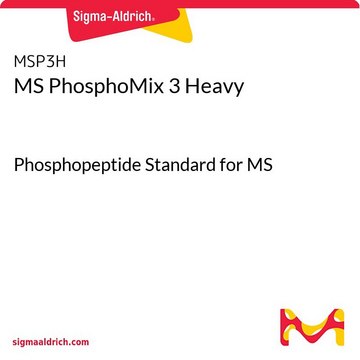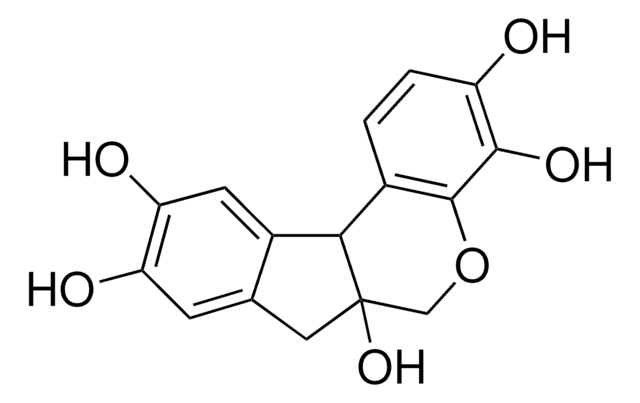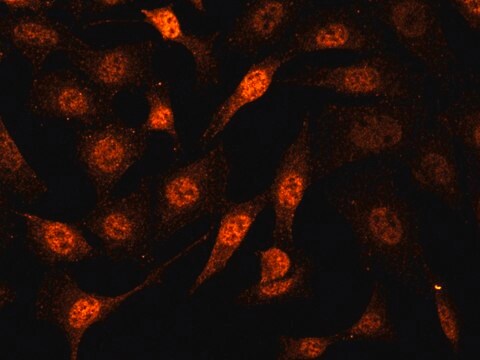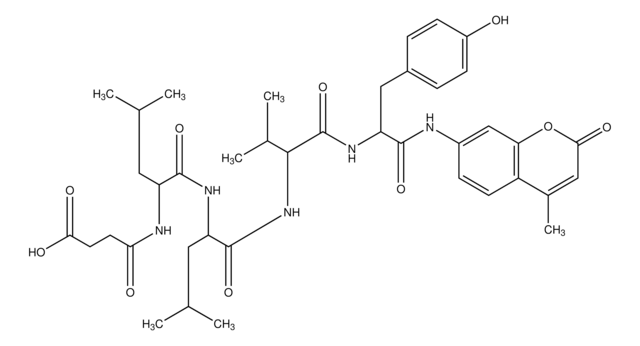APT280
20S Proteasome Activity Assay
Synonyme(s) :
20S Proteasome Assay, Proteasome Activity Kit, Proteasome Assay, proteosome activity assay kit
Se connecterpour consulter vos tarifs contractuels et ceux de votre entreprise/organisme
About This Item
Code UNSPSC :
12161503
eCl@ss :
32161000
Nomenclature NACRES :
NA.84
Produits recommandés
Gamme de produits
Chemicon®
Niveau de qualité
Espèces réactives
mammals
Technique(s)
activity assay: suitable
Description générale
Introduction:
The ubiquitin-proteasome pathway is the major proteolytic system in the cytosol of eukaryotic cells, where it catalyzes the selective degradation of short-lived regulatory proteins and the rapid elimination of proteins with abnormal conformation (Hershko & Ciechanover 1998; Hochstrasser 1996). The critical protease in this pathway is the 26S proteasome, an ATP-dependent proteolytic complex, which is formed by the association of the barrel-shaped 20S proteasome (700-kDa) and two 19S (700-kDa) regulatory complexes (Baumeister et al. 1998; Coux et al. 1996). The 20S Proteasome, catalytic core of the proteasome complex, is responsible for the breakdown of key proteins involved with apoptosis, DNA repair, endocytosis, and cell cycle control (Coux et al. 1996; Hoffman & Rechsteiner 1996; Hochstrasser 1995). The CHEMICON® Proteasome Activity Assay Kit provides a quick, efficient and sensitive system for evaluation of proteasome activity in cell lysates or inhibitor screening.
Test Principle:
Chemicon′s Proteasome Activity Assay Kit provides a simple and convenient means for assaying proteasome activity that recognize the substrate LLVY (Meng et al. 1999). The assay is based on detection of the fluorophore 7-Amino-4-methylcoumarin (AMC) after cleavage from the labeled substrate LLVY-AMC. Absorption=351nm. Emission=430nm. The free AMC fluorescence can be quantified using a 380/460 nm filter set in a fluorometer.
A proteasome inhibitor, Lactacystin, is included as a test inhibitor for screening purpose. Lactacystin is a microbial natural product and the most specific and potent inhibitor of proteasomes currently known (Fenteany & Schreiber 1998).
Application:
The Proteasome Activity Assay Kit is a relatively quick method for detection of intracellular proteasome activity. Testing of purified proteasome enzyme, in vitro inhibitor screening and the study of proteasome regulation can be performed with this assay.
The CHEMICON Proteasome Activity Assay Kit is intended for research use only, not for diagnostic or therapeutic applications.
The ubiquitin-proteasome pathway is the major proteolytic system in the cytosol of eukaryotic cells, where it catalyzes the selective degradation of short-lived regulatory proteins and the rapid elimination of proteins with abnormal conformation (Hershko & Ciechanover 1998; Hochstrasser 1996). The critical protease in this pathway is the 26S proteasome, an ATP-dependent proteolytic complex, which is formed by the association of the barrel-shaped 20S proteasome (700-kDa) and two 19S (700-kDa) regulatory complexes (Baumeister et al. 1998; Coux et al. 1996). The 20S Proteasome, catalytic core of the proteasome complex, is responsible for the breakdown of key proteins involved with apoptosis, DNA repair, endocytosis, and cell cycle control (Coux et al. 1996; Hoffman & Rechsteiner 1996; Hochstrasser 1995). The CHEMICON® Proteasome Activity Assay Kit provides a quick, efficient and sensitive system for evaluation of proteasome activity in cell lysates or inhibitor screening.
Test Principle:
Chemicon′s Proteasome Activity Assay Kit provides a simple and convenient means for assaying proteasome activity that recognize the substrate LLVY (Meng et al. 1999). The assay is based on detection of the fluorophore 7-Amino-4-methylcoumarin (AMC) after cleavage from the labeled substrate LLVY-AMC. Absorption=351nm. Emission=430nm. The free AMC fluorescence can be quantified using a 380/460 nm filter set in a fluorometer.
A proteasome inhibitor, Lactacystin, is included as a test inhibitor for screening purpose. Lactacystin is a microbial natural product and the most specific and potent inhibitor of proteasomes currently known (Fenteany & Schreiber 1998).
Application:
The Proteasome Activity Assay Kit is a relatively quick method for detection of intracellular proteasome activity. Testing of purified proteasome enzyme, in vitro inhibitor screening and the study of proteasome regulation can be performed with this assay.
The CHEMICON Proteasome Activity Assay Kit is intended for research use only, not for diagnostic or therapeutic applications.
Application
Lysis buffer: 50 mM HEPES (pH 7.5), 5 mM EDTA, 150 mM NaCl and 1% Triton X-100. Addition of 2 mM ATP to the lysate will improve the recovery of intact 26S proteasome.
Also see: Hoffman, L. 1992 at http://www.jbc.org/cgi/reprint/267/31/22362.pdf
Also see: Hoffman, L. 1992 at http://www.jbc.org/cgi/reprint/267/31/22362.pdf
The Proteasome Activity Assay Kit provides a simple & convenient means for assaying proteasome activity that recognize the substrate LLVY.
Autres remarques
Unless otherwise stated in our catalog or other company documentation accompanying the product(s), our products are intended for research use only and are not to be used for any other purpose, which includes but is not limited to, unauthorized commercial
Informations légales
CHEMICON is a registered trademark of Merck KGaA, Darmstadt, Germany
Code de la classe de stockage
10 - Combustible liquids
Certificats d'analyse (COA)
Recherchez un Certificats d'analyse (COA) en saisissant le numéro de lot du produit. Les numéros de lot figurent sur l'étiquette du produit après les mots "Lot" ou "Batch".
Déjà en possession de ce produit ?
Retrouvez la documentation relative aux produits que vous avez récemment achetés dans la Bibliothèque de documents.
Notre équipe de scientifiques dispose d'une expérience dans tous les secteurs de la recherche, notamment en sciences de la vie, science des matériaux, synthèse chimique, chromatographie, analyse et dans de nombreux autres domaines..
Contacter notre Service technique








